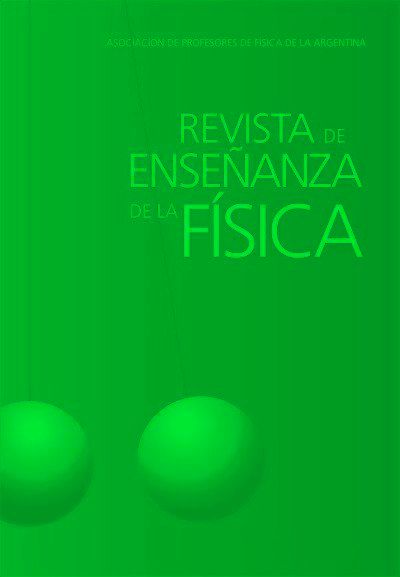Model for evaluating the proof argument in a model-based teaching context
DOI:
https://doi.org/10.55767/2451.6007.v33.n2.35196Keywords:
Physics education, Argumentation, Argument proof, Mathematical modeling, Quality of the argumentAbstract
The study starts from the general characterization of the stages that compose the process of mathematical modeling, emphasizes in a
special way the stage to which our approach is focused (obtaining and validating models) and then addresses the structure of the
argument proposed by Toulmin (2006) as well as the theory of types and levels of proof in mathematics by Nicolas Balacheff
(1987,1988). This last study, when placed in the context of the use of TAP (Toulmin's Argument Pattern) in a model-based teaching
context configures a theoretical and methodological approach that allows analyzing the nature of the justifications and supports
employed in said argumentative process as well as classifying the data and evaluating the conclusion. This tool also allows a diagnostic
evaluation of the student's level of knowledge regarding the use of proof and demonstration in Physics Teaching. It is, therefore, a tool
that allows combining all the elements of TAP with Nicolas Balacheff's (1987, 1988) theory of the types and levels of proof.
References
Almeida, L. W., Silva, K. P e Vertuan, R. E. (2012). Modelagem Matemática na Educação Básica (1ªed). São Paulo : Contexto.
Balacheff, N. (1987). Processus de Preuve et situations de Validation. Education Studies in Mathematics,18 (2), 147-176.
Balacheff, N. (1988). Aspects of proof in pupils’ practice of school mathematics. Pimm D. (ed.) Mathematics, Teachers
and Children. 230-316.
Bassanezi, R. C. (2019). Ensino-aprendizagem com modelagem matemática (4ª ed.). São Paulo: Contexto.
Biembengut, M. S., Hein, N. (2007). Modelagem matemática no ensino. (4ª ed.). São Paulo: Contexto.
Boavida, A. M. R. (2005). A argumentação em Matemática Investigando o trabalho de duas professoras em contexto de
colaboração. 975f. Tese (Doutorado em Educação) - Faculdade de Ciências, Universidade de Lisboa.
Conner, A. (2012). Warrants as indications of reasoning patterns in secondary mathematics classes. In Proceedings of
the 12th International Congress on Mathematical Education (ICME-12), 2819–2827. Seoul, Korea, Disponível em:
http://www.lettredelapreuve.org/pdf/ICMI-12/TSG14_Conner.pdf. Accesso em 24 jul. 2020.
Conner, A. M., Singletary, L. M., Smith, R. C., Wagner, P. A. e Francisco, R. T. (2014). Identifying Kinds of Reasoning in
Collective Argumentation, Mathematical Thinking and Learning, 16(3), 181-200.
https://doi.org/10.1080/10986065.2014.921131
Dede, A. T. (2019). Arguments constructed within the mathematical modelling cycle, International Journal of
Mathematical Education in Science and Technology, 50(2), 292-314, https://doi.org/10.1080/0020739X.2018.1501825
Erduran S., Simon S. e Osborne J. (2004). TAPping into Argumentation: Developments in the Application of Toulmin's
Argument Pattern for Studying Science Discourse. Science Education, 88(6), 915–933. DOI:10.1002/sce.20012
English L. D. e Sriraman B. (2010). Problem solving for the 21st century. In: English L. D., Sriraman B., editors. Theories of
mathematics education: seeking new frontiers. (263–285). Berlin: Springer.
Inglis, M., Mejia-Ramos, J.P e Simpson, A. (2007). Modelling mathematical argumentation: the importance of
qualification. Educ Stud Math, 66, 3-21. https://doi.org/10.1007/s10649-006-9059-8
Kelly, G.J e Takao, A. (2002).Epistemic levels in argument an analysis of university oceanography student’s use of evidence
in writing. Science Education, 86(3), 314-342. https://doi.org/10.1002/sce.10024
Lin, Pi-Jen. (2018). O Desenvolvimento da Argumentação Matemática por Estudantes de uma Turma do Ensino
Fundamental. Educ. Real. 43(3), 1171-1192. https://doi.org/10.1590/2175-623676887
Monteiro, M.A.A., Santos, D.A., Teixeira, O. P. B. (2007). Caracterizando a autoria no discurso em sala de aula.
Investigações em Ensino de Ciências, 12(2), 205-225. Recuperado de:
https://www.if.ufrgs.br/cref/ojs/index.php/ienci/article/view/472/274. Acesso em 20 de maio de 2021.
Monteiro, M.A.A., Teixeira, O.P.B. (2019). Contextos argumentativos e processos interativos em sala de aula. In: Bozelli,
F.C.; Teixeira, O.P.B. Contextos argumentativos e discursivos no ensino de ciências (1ª ed.). São Paulo: Espelho D’alma.
Nardi, E., Biza, I., Zachariades, T. (2012). “Warrant” revisited: Integrating mathematics teachers’ pedagogical and
epistemological considerations into Toulmin’s model for argumentation. Educational Studies in Mathematics, 79(2), 157–
173, 2012. https://doi.org/10.1007/s10649-011-9345-y.
Sá, L. P. e Queiroz, S. L. (2011). Argumentação no ensino de ciências: contexto brasileiro. Ens. Pesqui. Educ. Ciênc. (Belo
Horizonte) [online], 13(2), 13-30. https://doi.org/10.1590/1983-21172011130202.
Toulmin, S. (2006). Os usos do argumento (2ª ed.) Trad. Reinaldo Guarany. São Paulo: Martins Fontes.
Vaz, R. (2004). O uso das isometrias do software Cabri-Gèométre como recurso no processo de prova e demonstração.
Dissertação (Mestrado em Educação Matemática). São Paulo: PUC/SP
Downloads
Published
Issue
Section
License
Copyright (c) 2021 Fredy Coelho Rodrigues, Marco Aurélio Alvarenga Monteiro

This work is licensed under a Creative Commons Attribution-NonCommercial-NoDerivatives 4.0 International License.
Aquellos autores/as que tengan publicaciones con esta revista, aceptan los términos siguientes:Los autores/as conservarán sus derechos de copiar y redistribuir el material, bajo los términos estipulados en la Licencia de reconocimiento, no comercial, sin obras derivadas de Creative Commons que permite a terceros compartir la obra bajo las siguientes condiciones:
- Reconocimiento — Debe reconocer adecuadamente la autoría, proporcionar un enlace a la licencia e indicar si se han realizado cambios. Puede hacerlo de cualquier manera razonable, pero no de una manera que sugiera que tiene el apoyo del licenciador o lo recibe por el uso que hace.
- NoComercial — No puede utilizar el material para una finalidad comercial.
- SinObraDerivada — Si remezcla, transforma o crea a partir del material, no puede difundir el material modificado.
- Los autores/as podrán adoptar otros acuerdos de licencia no exclusiva de distribución de la versión de la obra publicada (p. ej.: depositarla en un archivo telemático institucional o publicarla en un volumen monográfico) siempre que se indique la publicación inicial en esta revista.
- Se permite y recomienda a los autores/as difundir su obra a través de Internet (p. ej.: en archivos telemáticos institucionales o en su página web) antes y durante el proceso de envío, lo cual puede producir intercambios interesantes y aumentar las citas de la obra publicada. (Véase El efecto del acceso abierto).










